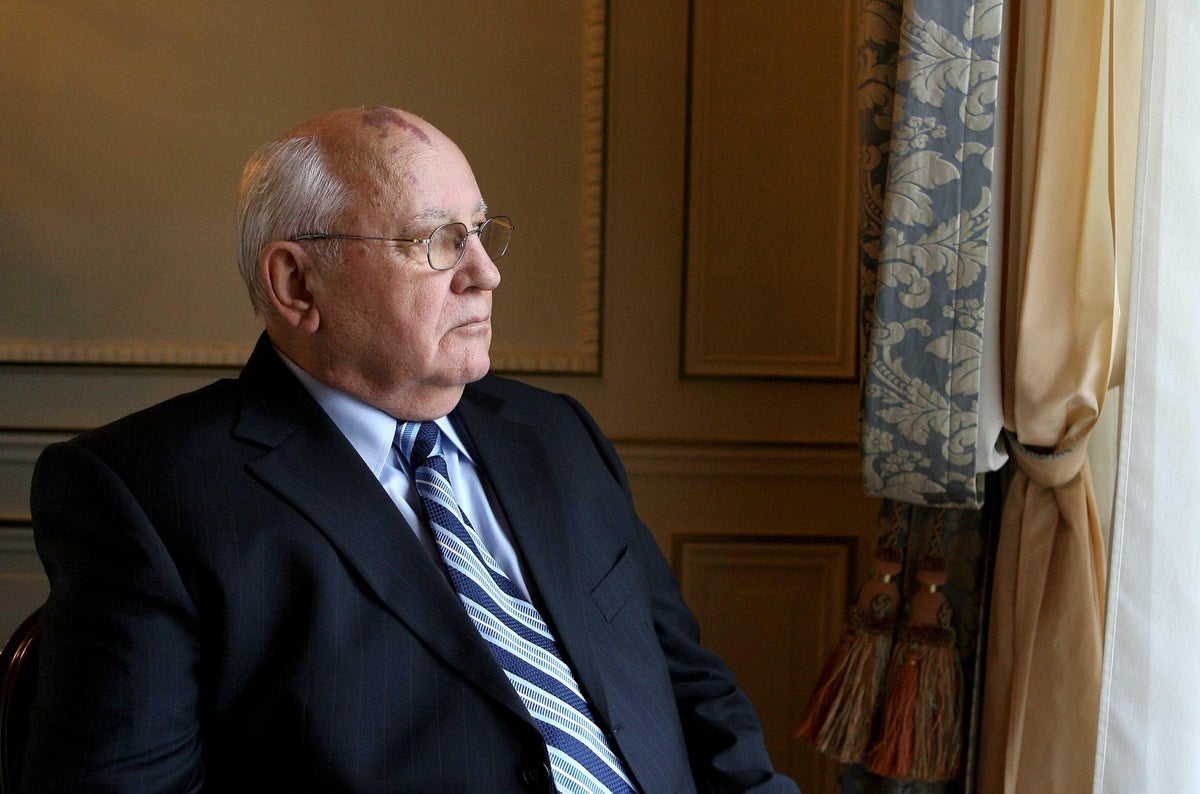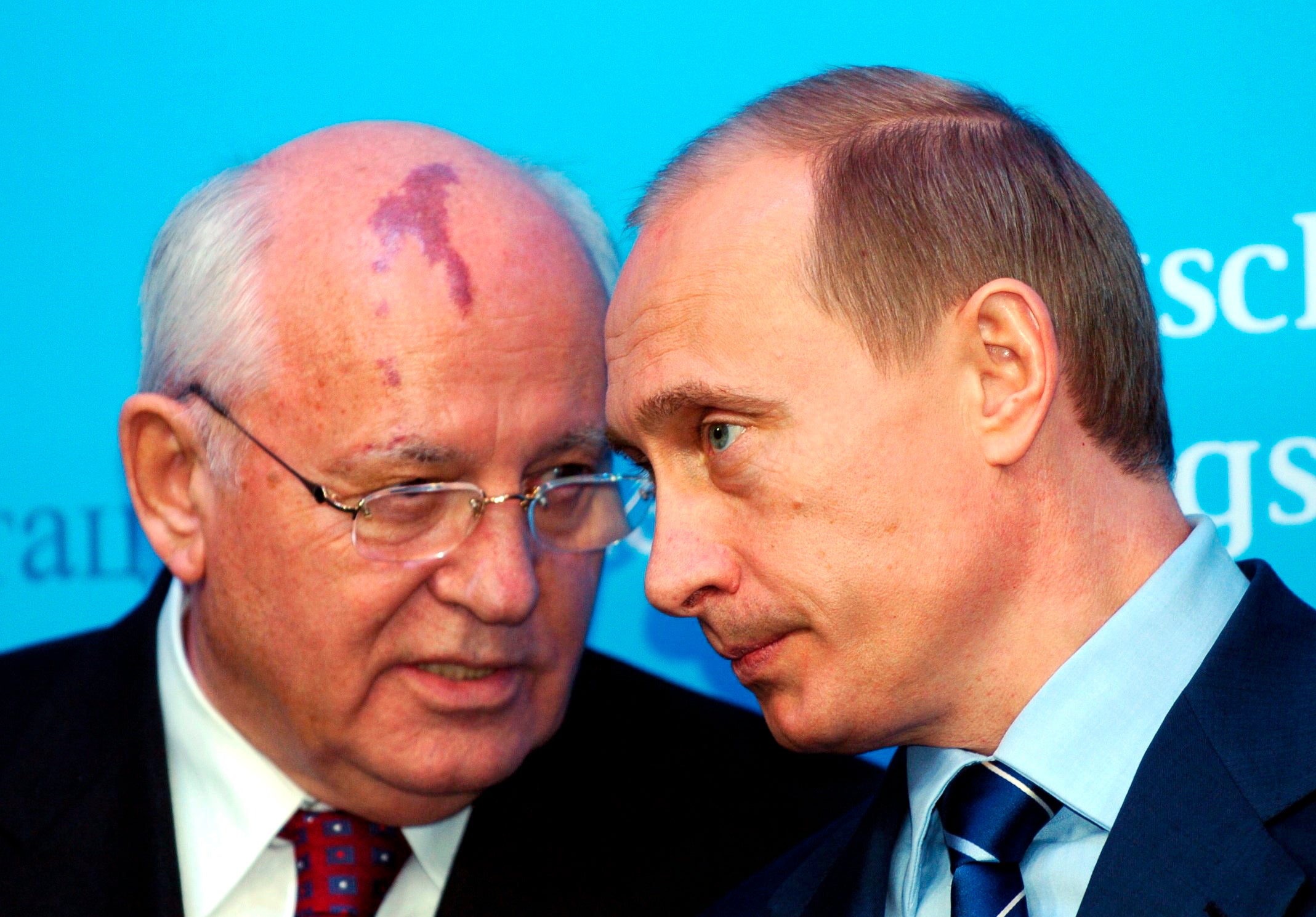
Mikhail Gorbachev, a man widely lauded in the West for reforms that changed the world but were often condemned at home, has died at the age of 91.
Moscow’s Central Clinical Hospital said the last leader of the Soviet Union had died after a long illness but provided no other details.
At the height of his influence, Gorbachev was the tip of the spear pushing for exciting reforms and demands for more openness within a system that for decades had been closed and set against the US in a superpower battle for supremacy and survival.
Indeed, at times during the Cold War, such as the feverish Cuban missile crisis of 1962, it appeared that the stand-off would end in nuclear annihilation for everyone.
Rather, Gorbachev and his supporters became associated with a new lexicon that was picked up by many in the West, words such as “perestroika”(reform,) and “glasnost ” (openess).
As it was, neither the Soviet Union or its most striking symbols, such as the Berlin Wall, could endure that pressure for reform, and his actions triggered a domino effect of falling capitals, to be replaced by new states, in a geopolitical transformation not witnessed since the destruction of Nazi Germany by the allied powers in 1945.
“If the Soviet Union had wished, there would have been nothing of the sort and no German unification,” he would later reflect in an interview with a Canadian broadcaster. “But what would have happened? A catastrophe or World War Three.”
Gorbachev, the eighth and final general secretary of the Communist Party of the Soviet Union, who served from 1985 until 1991, was frequently praised in the West. In 1990, for instance, he was awarded the Nobel Peace Prize.
But at home in Russia there was a group of Soviet nationalists, and others, opposed to the reforms he introduced to a system established in 1922, in the years after the Russian Revolution. In 1991, he survived a coup attempt.
And while Russia’s leader Vladimir Putin praised Gorbachev following his death as a statesman, feting him publicly as recently as his 90th birthday, in truth Putin despised what he did to the Soviet Union.
“First and foremost it is worth acknowledging that the demise of the Soviet Union was the greatest geopolitical catastrophe of the century,” Putin said in one televised address back in 2005. “As for the Russian people, it became a genuine tragedy. Tens of millions of our fellow citizens and countrymen found themselves beyond the fringes of Russian territory.”
Indeed, some analysts believe Putin’s recent invasion of Ukraine is part of a broader effort to restore Russia’s empire, and redress the sense of humiliation he reportedly felt as a KGB officer serving in what was East Germany when the Soviet Union collapsed on Gorbachev’s watch.
Speaking in Red Square this May on Russia’s traditional Victory Day, the day Soviet forces help defeat the Nazis in World War II, Putin said: “Russia called on the West for an honest dialogue, to search for reasonable, compromise solutions, to take into account each other's interests. All in vain. The Nato countries did not want to hear us, which means that in fact they had completely different plans.”
He added: “The danger grew every day. Russia gave a preemptive rebuff to aggression. It was a forced, timely and the only right decision. The decision of a sovereign, strong, independent country.”
Mikhail Sergeyevich Gorbachev was born on March 2 1931, in the village of Privolnoye in southern Russia. Both of his grandfathers were peasants, collective farm chairmen and members of the Communist Party, as was his father. He was 10 when his father left for war. Unlike many boys in the village, when the war was over Gorbachev’s father returned.
Like his father, he began working in the fields, his skills and dedication earning him the Red Banner of Labour, at the age of 17.
Reuters reported it was that that prize, combined with the party background of his parents, that helped him secure admission in 1950 to the country's top university, Moscow State. It was there that he met his wife, Raisa Maximovna Titorenko, and joined the Communist Party.
Gorbachev rose through the ranks, mentored by the likes of Nikita Krushchev and became a full Politburo member in 1980.
When Leonid Brezhnev died in 1982, there was demand from some quarters for a younger leader, but instead the authorities backed two other older men, Yuri Andropov, and then another of Gorbachev's mentors, Konstantin Chernenko. When Chernenko died in 1985, Gorbachev was selected to lead the country. He was a relatively youthful 54.

Almost immediately, Gorbachev was confronted with a crisis, in the form of the Chernobyl nuclear power station disaster in Ukraine in April 1986. It was Gorbachev who would first speak of the disaster to the nation and the wider world, saying: “This is one more tolling of the bell, and a new terrible warning, that in the nuclear age what is needed is new political thinking and new policies.”
In the West, Gorbachev found a partner for brokering peace in US president Ronald Reagan, who himself knew a thing or two about making headlines.
Standing close to the concrete barrier that had bisected Berlin into capitalist and communist sectors since 1961, Reagan declared: “Mr Gorbachev, tear down this wall.”
As it was, Reagan and Gorbachev had already met, in October 1986 at the Reykjavík Summit. That meeting initially ended in failure, but a year later the two sides would sign the Intermediate-Range Nuclear Forces Treaty, a major arms control agreement.
“For everyone, and above all for our two great powers, the treaty whose text is on this table offers a big chance, at last, to get onto the road leading away from the threat of catastrophe,” Gorbachev would say.
In June 1990, Reagan’s successor George HW Bush signed another historic agreement, namely to end production of chemical weapons and begin the destruction of both nations’ stockpiles of them.
Gorbachev’s final day as leader of the Soviet Union was on 25 December 1991. Two weeks earlier, accords had been signed to create a succession of new nations from the old Soviet Union, most importantly Russia, Ukraine and Belarus.
In his later years, Gorbachev assumed the position of an iconic figure within the West, someone who had helped end the Cold War and extinguish the existential threat between two nuclear-armed superpowers.
He also did not mind having a joke or two and in 1998 he featured in television advertisement by Pizza Hut, filmed on Moscow’s Red Square.
Yet, he never lost his focus on what he considered important. Earlier this year, after Putin ordered troops into Ukraine, the Gorbachev Foundation issued a statement saying: “In connection with Russia's military operation in Ukraine, begun on February 24, we affirm the need for an early cessation of hostilities and immediate start of peace negotiations. There is nothing more precious in the world than human lives.“
On Tuesday, tributes poured in for Gorbachev from around the world.
Former US secretary of state Henry Kissinger told the BBC he had “performed great services” but was “not able to implement all of his visions”.
He added: “The people of eastern Europe and the German people, and in the end the Russian people, owe him a great debt of gratitude for the inspiration, for the courage in coming forward with these ideas of freedom.”
There were also warm words from the likes of European Commission president Ursula von der Leyen and Condoleezza Rice.
UN secretary general Antonio Guterres said: ”I was deeply saddened to learn of the passing of Mikhail Gorbachev, a one-of-a kind statesman who changed the course of history. He did more than any other individual to bring about the peaceful end of the Cold War.”
Moscow’s Central Clinical Hospital said in a statement that Gorbachev died after a long illness. No other details were given.
Kremlin spokesman Dmitry Peskov said in a statement that President Putin offered deep condolences over Gorbachev's death and would send an official telegram to his family in the morning.
Additional reporting by agencies







